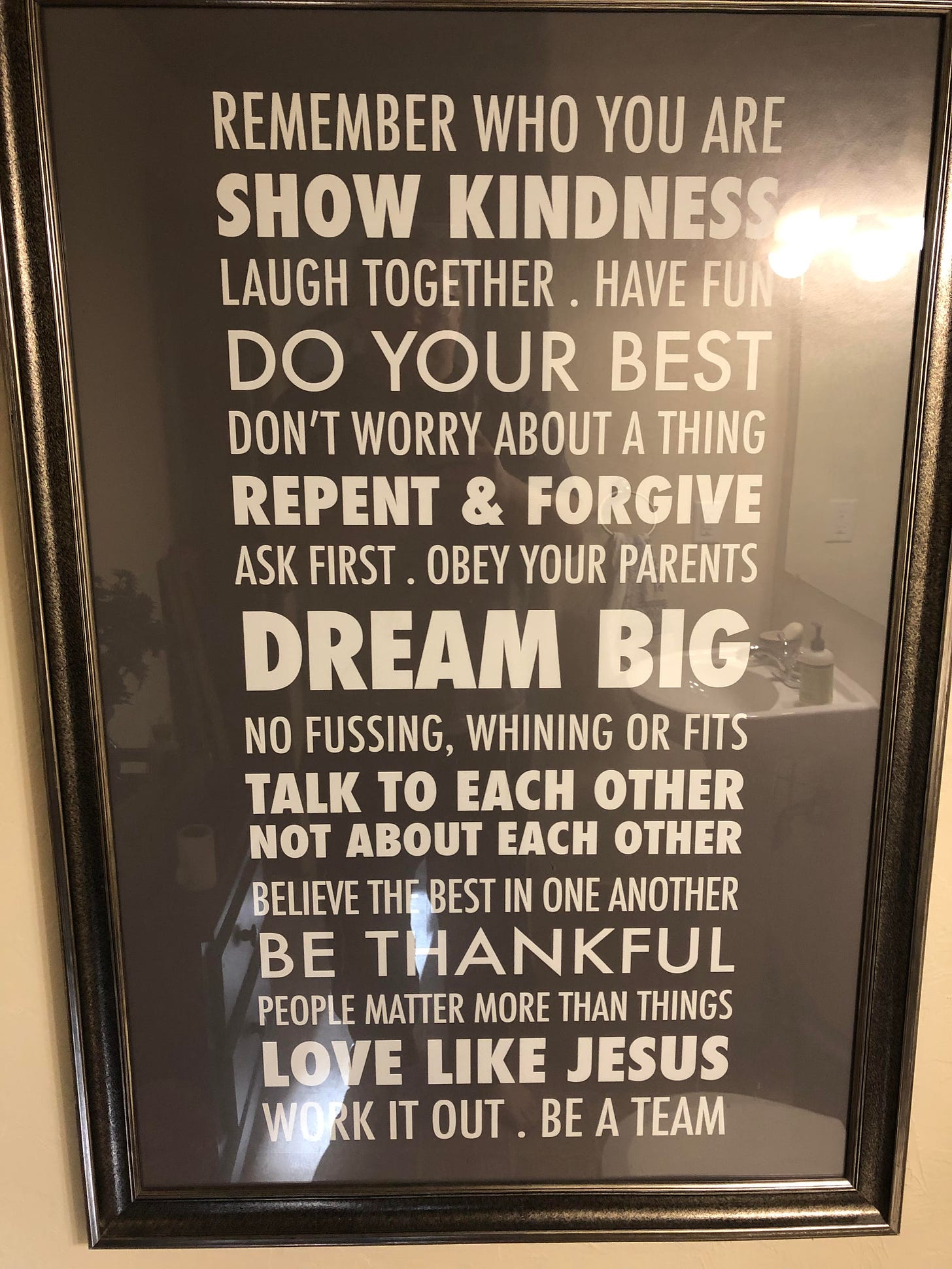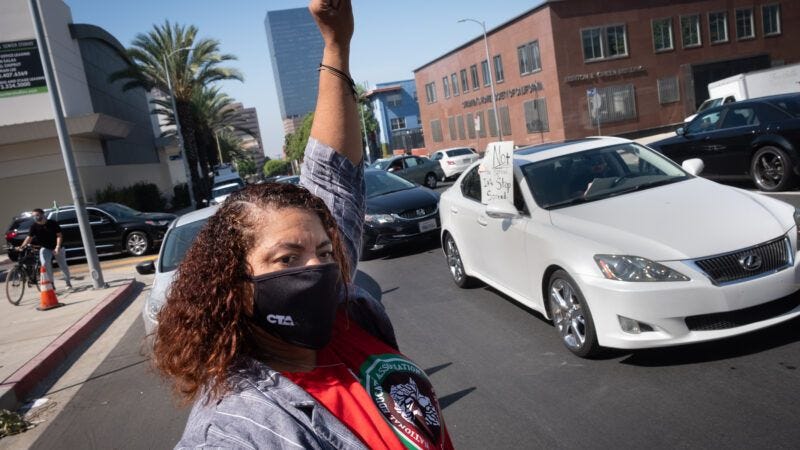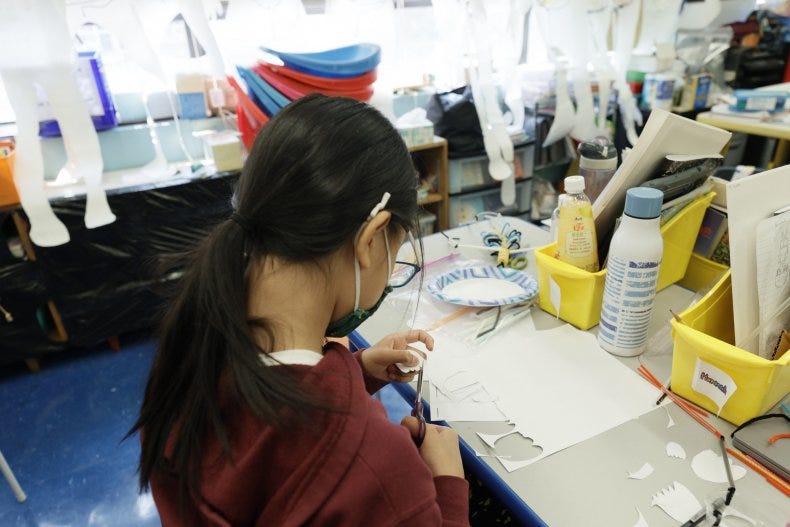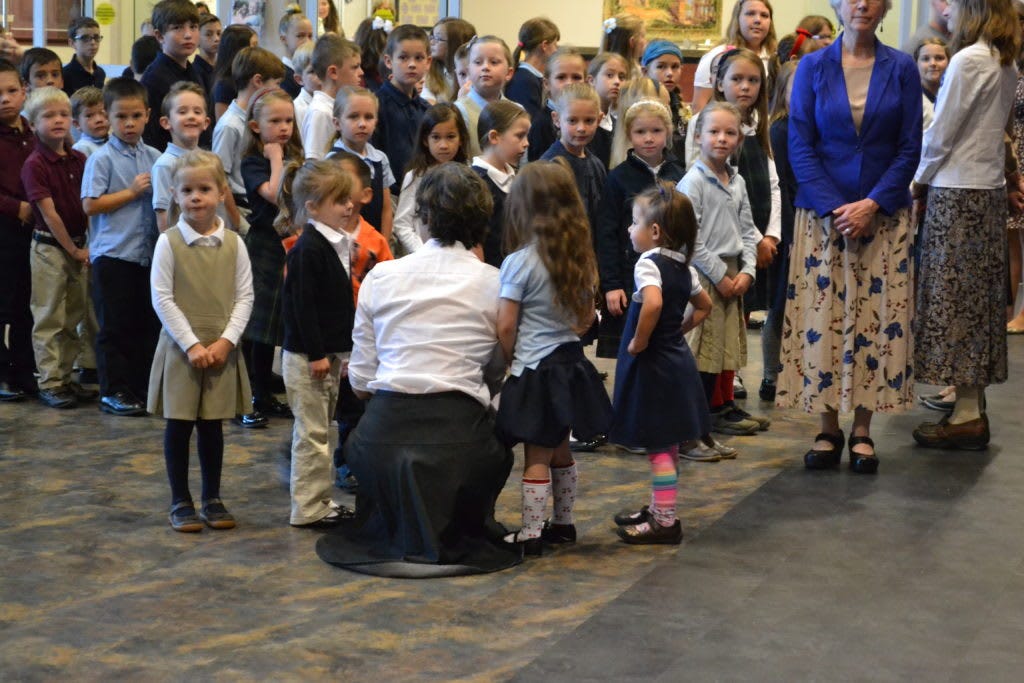Dear Reader,
Perhaps like you, I did all my best parenting before I had kids. Still, almost 23 years down the parenting road (and just before school starts - when it should, after Labor Day, and none of that early-to-mid August silliness), I’ve picked up a few tips and tricks that I thought I’d share as part of this week’s feature article.
In the meantime, I’ve themed this week’s Hot Takes along educational lines, as well as pulled out a favorite Posterity post to tie things together. I hope you’re able to take the time to enjoy them as you head into the long weekend.
It’s been encouraging to continue to hear from so many of you (many in person) as to what much this little newsletter has meant for your Friday mornings. Your encouragement is what keeps me going (and often up late on Thursday nights) and I’ll never take that for granted.
As always, thanks for reading.
Craig
P.S.: As a reminder, you’re welcome and encouraged to email me directly with feedback, ideas, links, etc. at cmdunham [at] gmail [dot] com. Just know that, unless you specifically tell me not to, I may quote you here (though it will always be anonymously).
Hot Takes
Here are some stories that caught my eye this week:
Rogue teachers union representatives and administrators with a severe lack of ethics continue to make strong arguments for school choice. On the west coast,
“The head of United Teachers Los Angeles—the city's teachers union—thinks that pandemic-related learning losses are a myth and that the thousands of students who slogged through virtual school last year are doing just fine.
‘There's no such thing as learning loss,’ Cecily Myart-Cruz told Los Angeles magazine in a recent interview. Myart-Cruz did acknowledge that students' achievements in mathematics, for instance, might have been harmed by virtual learning, but she asserted that the experience of surviving 2020–2021 somehow makes up for this.
‘Our kids didn't lose anything,’ she said. ‘It's OK that our babies may not have learned all their times tables. They learned resilience. They learned survival. They learned critical-thinking skills. They know the difference between a riot and a protest. They know the words insurrection and coup."
Multiplication tables and vocabulary aside, the patronizing tone and language describing “our babies” betrays a bias that shouldn’t sit well with most parents. Families are not looking for teachers unions to barter with their children’s education; they’re looking for teachers to teach, and to do so without an overabundance of “woke” propaganda presented for the sake of itself.
“It is brutally unfair that thousands of parents have no alternative but to entrust their kids' education to a system in which people like Myart-Cruz hold the power. Union officials who want to keep employees at home for as long as possible—and don't care how little math is being taught to students—do not have the kids' best interests in mind. They are demanding tremendous sacrifices from everyone else, and they have no reason to compromise because there's zero accountability.
This is why all families deserve school choice: If education officials simply refuse to give students what they need, students should have every right to go elsewhere—and take their share of the system's education funds with them. No educator who shrugs at the idea of kids falling behind in reading and math is entitled to tax dollars.”
Agreed.
Meanwhile, on the east coast,
“A two-year Baltimore City school system investigation has found that administrators at one city high school schemed to inflate enrollment, pressured teachers to change grades and scheduled students into classes that didn’t exist.
The report is a devastating account of how the former principal of Augusta Fells Savage Institute of Visual Arts and three other administrators fabricated courses and approved students for graduation when they had failed to legitimately pass classes. While the report does not determine a motive, principals’ evaluations are based on graduation and attendance rates.”
None of this should be surprising in light of that last sentence. People do crazy things when it comes to justifying their existence numerically, and this is no exception. Unfortunately, the impact always goes beyond those creating it.
“‘It is crushing. It is disgusting...It is the antithesis of what we stand for,’ said city school system CEO Sonja Santelises. ‘The fact that people think so little of our children and our educators that they take shortcuts that ultimately undermine not only the public’s confidence in our schools, but mostly that shortcuts the confidence’ students have in themselves.
Santelises said when students are told to sign up for classes that aren’t held or their grades are changed it signals to them that the school doesn’t believe they are capable of completing the work, and that is particularly harmful to students.”
Santelises gets it (at least in print), but it’s going to be a long road back for her schools. Until harder nosed accountability based on more than just numbers prevails, don’t be surprised when you read more of this kind of thing happening, accompanied by calls from more and more parents to be able to take their students’ allotted funds and go elsewhere.
“Children Should be Taught Philosophy in School” - And now for something refreshingly different, here’s an article in Newsweek making the case for the value of philosophy in…elementary schools? But first, the practical facts:
“Research shows that, of all of the humanities majors available in modern universities, philosophy majors have the highest earning potential at all stages in their career after graduating. The average median salary of a philosophy major with 10 to 20 years of experience in the job market is roughly $82,000. By no means are philosophy majors generally rich, like business majors, but they are living comfortably. And their livelihood is directly attributable to their philosophy studies. It is no wonder that businesses are now eager to hire employees with philosophy degrees—which has resulted in record upticks in philosophy majors. Of all the non-STEM majors, philosophy majors are empirically the most employable across different fields. Ignoring these facts in light of current jobless or under-employed college graduates would be profoundly negligent.”
The author - a graduate student studying (you guessed it) philosophy - goes on:
“The discipline of philosophy brings a whole host of practical skills that are seldom if ever found elsewhere in our educational system—especially when considering pre-college education. One such skill is the elucidation and clarification of complex and abstract ideas, such as those found in the sciences. This ability is indispensable for educators and writers alike, who often struggle to apply these abilities in their work. For example, a large part of why there is so much vaccine hesitancy currently is precisely because public health officials have failed to express the science of vaccines in a clear and digestible manner. Frankly, most people don't have the reasoning needed to unravel such information by themselves. Our society would be far better off if most people had these vital skills—teaching philosophy is a near-guaranteed manner of attaining them.”
Apart from a few correlation/causation stretches, there is much to commend in this piece to bring balance to our overly pragmatic modern educational system. It’s worth a full read.
Raising Adults
Earlier this week, I attended what I anticipate being the final “Back to School Night” of my parenting career. Having graduated three daughters from high school, Megan and I are about to embark with our fourth on her senior year, and with it, the last round of everything our family loves and loathes about the high school experience.
Let me explain. No, there is too much. Let me sum up.
As a family, we’ve never promulgated too many romantic notions about high school and its “last year” being the “best year of your life,” etc., because, well, it’s high school. Yes, there are many and meaningful things to enjoy and celebrate across the nine months leading up to graduation, but, Lord willing, life goes on past 18. Anyone else who says differently has watched Grease too many times.
With our kids, we’ve tried to be intentional in avoiding the “we have a senior this year, so nothing else matters” mentality. Sure, we’ve taken senior pictures; of course, we’ve attended “senior nights” when our girls participated in their final sporting, musical, or dramatic event; yes, we’ve tolerated silliness at which even our girls rolled their eyes but participated in because going against the flow wasn’t worth the fight. Prom, for example. Having to purchase personalized warm-ups for every sport every year. Teenage romances and inevitable break-ups. Your basic high school hoopla.
But let’s get more serious: class rank, ACT/SAT scores, the push to know exactly what the plan is after high school - we couldn’t have cared less about any of it.
Couldn’t. Care. Less.
Some might say we only say this because our girls have been decent students, have enjoyed learning and school (most of the time), and have worked hard at doing good work. Indeed, all of this is true, but I would counter that at least part of the reason for their success is they didn’t feel crushing pressure from us to be or do otherwise.
No, when it has come to school, what we’ve tried to care most about has been our girls’ character, heart, and virtue - in relation to God, to us, to each other, to others (friends and frenemies), and especially to those in need, taking Jesus at his word in Luke 16:10:
“One who is faithful in a very little is also faithful in much, and one who is dishonest in a very little is also dishonest in much.”
If, we reasoned, degrees of faithfulness and integrity are indicators of what might come, then those should be the baskets (held in the hands of the Lord) in which we put all our eggs. Class rank, standardized test scores, knowing what to study in college - even going to college at all - none of that matters without faithfulness and integrity, at least biblically speaking.
Of course, it’s never easy being kids of a headmaster, a tension my girls lived with (pretty gracefully, really) for eight years in two different school settings. But even then, our emphasis was not on their performance but on building their trust that, as the Father said of the Son in Matthew 3:17, the girls knew they were our beloved children with whom we were well-pleased, and without having to do anything to deserve it.
Eight Parenting Tips for “Back to School”…and Beyond
A friend of mine says that successful parenting is when your kids can afford their own therapy. We laugh about that as a family, as our girls know both Megan and I have made good use of counseling over our almost 25 years together. They also (unfortunately) know all too well how we’ve done a good job providing material for each of them for their counseling sessions later in life. Ahem.
But even in the midst of the damage we’ve done to our girls, I hope, by God’s grace, we did a few things right as well. Below are eight lessons I’ve learned and pray will make a difference in the lives of my kids. (Apply with caution and wisdom to your own.)
1) Children are a heritage from the Lord, and God loves and cares for His kids. Whether in the Psalms (see Psalm 127 and Psalm 139) or in the Gospels, God’s love for the youngest among us is real:
“At that time the disciples came to Jesus, saying, ‘Who is the greatest in the kingdom of heaven?’ And calling to him a child, he put him in the midst of them and said, ‘Truly, I say to you, unless you turn and become like children, you will never enter the kingdom of heaven. Whoever humbles himself like this child is the greatest in the kingdom of heaven. Whoever receives one such child in my name receives me, but whoever causes one of these little ones who believe in me to sin, it would be better for him to have a great millstone fastened around his neck and to be drowned in the depth of the sea.’” Matthew 18:1-6
In a culture and time that did not value children, Jesus’ acknowledgment and desire to be with them reveals their true worth as His creation. The times I have failed most as a parent have always been the times I have failed to recognize and honor the Imago Dei - the Image of God - in my children; consequently, I have treated them as less than the glorious creatures they are. I have had to ask God to spare me from the millstone more times than I care to admit.
2) The long-term goal of parenting is to raise adults, not children. If there’s a mistake parents (especially of young kids) make, it’s taking the short view. Proverbs 22:6 says,
“Train up a child in the way he should go; even when he is old he will not depart from it.”
Right after Millie was born, Megan and I used to be able to say that we had four kids, four-and-under. And it was true. And it was crazy. And people thought we were nuts. And it was, but we reminded each other that life was not always going to be like it was at that moment. These little people were going to become bigger people, and then - not later - was the time to train them in hopes that important things stuck. Despite the diapers and drama, we weren’t raising children; we were raising (eventual) adults.
3) A soft parent lives a hard life. This doesn’t mean you have to be cold-hearted, but it does mean you can’t be soft. The Bible has some tough words to say about this:
“Whoever spares the rod hates his son, but he who loves him is diligent to discipline him.” Proverbs 13:4
My heart breaks when I’m out in public and I see a child completely out of control of himself. Sure, sometimes kids are tired or have a bad day, but we’ve all witnessed outbursts - verbal, physical, etc. - that we know are normal for how that child behaves wherever he may be.
In most cases, it’s not the child’s fault; it’s the parents’, as they have not loved him enough to discipline him - faithfully, consistently, parentally. The saddest part? Without adjustment, the behavior only gets worse with age.
As parents, we have to draw lines - lines that are clear, reasonable, and non-negotiable - and when (not if) those lines are crossed, we have to respond consistently, fairly, and with enough love to discipline for the purpose of restoring trust and relationship. It takes faith and hope to discipline our kids, but the Scriptures can bear up under the weight of that trust. Subject the parenting advice from the latest psychology bestseller to the Word of God and see what washes out. Your kids will thank you for it later.
4) The sooner you recognize that, as a parent, you are not omnicompetent in your task, the sooner you’ll find others willing and able to help you be competent enough. In our church, when a family or child becomes a member, we as members stand and take vows as a congregation to come alongside them in support of their walk(s) with God. This would be a whole lot easier to do if parents were actually open to the help.
When I think back on the number of adults - singles, couples, friends, seniors, teachers, pastors - who have come alongside Megan and me as we raised our girls, I marvel at the embarrassment of riches we have had. But we had to decide early on to set aside our pride and welcome the help, which sometimes we did gracefully…and sometimes we didn’t so much (and usually regretted it later until we asked for it).
Deuteronomy 6:4-5 speaks to children and their parents in community when it says,
“Hear, O Israel: The Lord our God, the Lord is one. You shall love the Lord your God with all your heart and with all your soul and with all your might. And these words that I command you today shall be on your heart. You shall teach them diligently to your children, and shall talk of them when you sit in your house, and when you walk by the way, and when you lie down, and when you rise. You shall bind them as a sign on your hand, and they shall be as frontlets between your eyes. You shall write them on the doorposts of your house and on your gates.”
The “you” here is plural, as in “you all” (or y’all if you’re from the South). Moses is not addressing individuals individually; he is speaking to individuals in community.
Some have said, “It takes a village to raise a child.” Frankly, I’ve seen the village and I have little interest in it raising my kids. But I do want the Church coming alongside our family with a shared biblical vision of loving the Lord our God to form our kids. As much as we want to believe our children can get all that from us, their parents, they can’t; they need help because we need help…and that’s okay and by design.

5) The longer you insist on being the only advocate for your kids, the less they will be willing (and able) to be so for themselves as they get older. Where I see this mentality manifest itself of late is in groups like Bobcat Parents, which is a private Facebook group for parents of college students at Montana State University (as a father of two MSU students, I became a member simply for the entertainment value).
These parents (mostly mothers) post the latest injustice their college student is enduring at the hands of…somebody…fighting battles on his or her behalf because they - as the self-proclaimed “Mama Bears” - have always done this for their children. However, now that their kids are in their early twenties, they really should be the ones handling the “struggle” of finding the nearest laundromat or setting up their wi-fi.
The only interaction Megan or I have ever had with any of the universities our older three girls are attending is one email I wrote to the Dean of Students who kept sending emails to parents encouraging them to tell their students to be careful walking on snowy sidewalks. I wrote back and asked to be taken off the mailing list, reminding him he had my daughter’s email and could communicate with her directly, but I was confident my daughter (who was 19 and newly-married at the time) would eventually (if she hadn’t already) figure out how to walk on snowy sidewalks.
Kids will only learn to advocate for themselves when they have to; we have to teach them how, help them practice, let them do it, and then process with them after.
“My son, do not lose sight of these—keep sound wisdom and discretion, and they will be life for your soul and adornment for your neck. Then you will walk on your way securely, and your foot will not stumble.” Proverbs 3:21-23
6) How you speak at home will be how your kids speak…about everything, everywhere. When I was a teacher teaching ethics, by the end of the first month, I could pretty easily figure out every student’s politics, mostly because they mimicked the arguments and attitudes they had obviously heard at home.
While kids demonstrate more independence of thought as they grow older, how they’ve seen and heard us as parents respond to people and situations - particularly difficult ones - will mark how they do the same. This can be bad…or it can be good, depending how we do.
“Let no corrupting talk come out of your mouths, but only such as is good for building up, as fits the occasion, that it may give grace to those who hear. And do not grieve the Holy Spirit of God, by whom you were sealed for the day of redemption. Let all bitterness and wrath and anger and clamor and slander be put away from you, along with all malice. Be kind to one another, tenderhearted, forgiving one another, as God in Christ forgave you.” Ephesians 4:29-31
As a baseline, we always encouraged our girls to believe the best in people and did not allow them to speak poorly of others (including each other). Once they were able to keep the issue the issue, we then tried to listen and empathize, always working toward possible options for resolution that they could try, and always making a point to follow up to see how things went or were going.
7) The more you give your kids a chance to show you they can change and grow, the more they just might. One of the toughest parts of parenting is rebounding - from a bad conversation, a bad day, a bad week, a bad season - with our kids. It’s true that they go through stages and phases (newsflash: so do we), but it’s important we don’t allow those to seem fated and inevitable in their minds or in ours. People - especially kids - can change.
Who our kids might have been as third graders can be very different from who they were as eighth graders or now as freshmen in college. Those weaknesses that were once so off-putting can become strengths as their character matures. Those shallow and trite things they once thought so important can fade away, sometimes replaced by other shallow and trite things…or maybe improved upon by more important ideas and passions that run hotter and deeper than the ones they’d had before.
The point is that people - again, especially kids - are not static; we can learn and grow for the better - sometimes with resistance, often with time, always with affirmation.
One practice I’ve found helpful in cultivating encouragement is periodically writing each of my girls handwritten letters on the eve of unique opportunities that might hold opportunity for growth - first days of anything (school, new job); special trips away (camps, other travels); milestones (accomplishments, anniversaries). My favorites, though, are letters just to tell them I love them and am pleased with them. There is no greater message a child can hear from her father than this, nor greater joy for her father, as John wrote in 3 John 1:4 to his spiritual children, in expressing,
“I have no greater joy than to hear that my children are walking in the truth.”
8) Genuinely repenting and asking forgiveness from our kids when we sin against them may be the most important life-lesson we’ll teach that they’ll learn. I remember hearing the story of a man who, in 30 years of leading a particular parachurch ministry, traveled extensively around the world and was away from his family a good part of the time when his kids were growing up. The impact of his travels was significant - positive for the ministry, but negative for the family, so much so that his kids went down some bumpy roads into and through adulthood.
At the man’s funeral, one of his children spoke about him being gone so often and how much he felt he had missed out on getting to know his father. But then he said (and all the other adult siblings shook their heads in agreement) that the thing he loved and appreciated most about his father was how quick and faithful he was to genuinely ask forgiveness of his children whenever he had wronged them.
There are few things harder but more important to do than ask forgiveness of our kids - young and old - when we sin against them. We should know better; after all, we’re the adults. Yes and yes, but we also can be children ourselves, wounded by our own parents or past history in the way we handle our emotions. Speaking from experience, there is nothing more humbling - nor healing - than hearing, “I forgive you, Dad,” in response to asking forgiveness from the kids we love, whether they’re three or 23.
“Put on then, as God's chosen ones, holy and beloved, compassionate hearts, kindness, humility, meekness, and patience, bearing with one another and, if one has a complaint against another, forgiving each other; as the Lord has forgiven you, so you also must forgive. And above all these put on love, which binds everything together in perfect harmony.” Colossians 3:12-14
There you have it: eight free parenting tips for you. Have a good school year, everyone!
Post(erity): “First Days”
Each week, I choose a post from the past that seems apropos of something (of course, you’re always welcome to search the archives yourself whenever you like).
This week’s Posterity post, “First Days,” was my Opening Ceremony message from September 6, 2016, in which I mentioned a few other “first days” of merit that were worthy of consideration. An excerpt:
“Like most schools, we make a big deal about the first day of school, and I want to spend a few minutes this morning thinking about why first days are important.
There was a first day in Portugal in the late 1400s when a young sailor named Ferdinand Magellan – the first man we know of to circumnavigate the globe – saw the ocean for the very first time.
There was a first day in my home state of Illinois in the early part of the 19th century when a young Abraham Lincoln – our 16th President – learned about how our American government is made up of three branches.
There was a first day in England in the mid-to-late 1500s when a little boy named William Shakespeare first learned to pick up a pen and write.
There was a first day in Italy around that same time when a young Galileo Galileli first looked up and noticed the stars.
There was a first day in Africa in the mid-to-late 300s when a boy named Augustine first thought about God.”
Fresh & Random Linkage
“Every Single Cognitive Bias in One Infographic” - The idea and accompanying graphic make me want to hole up for half a day and just think about this.
“A Guide to Developing a Deep Reading Habit” - Some very simple, practical suggestions here that will have you reading (or reading again) in no time.
Until next time.
Why Subscribe?
Why not? Second Drafts is a once-a-week newsletter delivered to your inbox (you can also read it online or through your RSS reader) and it’s totally free.
Keep Connected
You’re welcome to follow me on Twitter.








